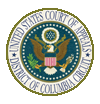- Courthouse
- Location
- Parking
- Public Transportation
- Courthouse Entrances
- Screening Information
- Electronic Device Policy of the U.S. Courts of the D.C. Circuit
- Courthouse Decorum Policy
- Liquids Policy
- Courtroom Locations
- Use of Facilities by Outside Groups
- Inclement Weather Notice
- Cafeteria
- Employment
- Solicitations
- Judges
- Resources & Contacts
- Case Information
- Attorney, Pro Se, and Media
- Advisory Committee on Judicial Conduct
- Notice of Change of Address
- Brief Compliance Checklist for Pro Se and Attorney Filers
- Notification of Scheduling Conflicts
- Attorney Admissions Information
- Criminal Justice Act Information and eVoucher
- Information for Litigants Representing Themselves (Pro Se)
- Attorney Rules of Disciplinary Enforcement
- Mediation Program
- Inclement Weather Notice
- Media Information
- Sealed Filings
- Rules & Procedures
- Circuit Rules
- Handbook of Practice and Internal Procedures
- Circuit Rules Proposed Amendments
- Circuit Rules Recent Amendments
- General Notices
- Guantanamo Cases - Orders Having General Application
- En Banc Endorsement of Panel Decisions (Irons Footnote)
- Mandatory Conflict Screening Plan
- Privately Funded Seminars
- Judicial Misconduct
- Site Map
Media Policy of the
U.S. Courts of the D.C. Circuit
June 5, 2018
In the interest of informing the public about the work of the Courts, the U.S. Courts of the D.C. Circuit welcome media coverage of cases. To assist members of the media who cover cases in the E. Barrett Prettyman Courthouse and the William B. Bryant Annex, the Courts' media policy is noted below:
General Rule – Visitors may bring electronic devices (e.g., cell phones, laptops, tablets, smart watches, etc.) into the courthouse and annex. All devices will be screened by Court Security Officers upon entry.
Access to Court Proceedings – In most cases, court proceedings are open to members of the media and the public. In certain cases, the Courts may put special procedures in place to address unique issues related to conducting a high-profile case. The use of electronic devices in courtrooms is governed by the following:
- Court of Appeals Proceedings – All electronic devices with cellular or WiFi capability must be turned off or put in airplane mode before entering a courtroom in which a Court of Appeals proceeding is being held. The use of electronic devices to take photographs, make audio or video recordings, or transmit live audio or video streaming is prohibited.
District and Bankruptcy Court Proceedings – All electronic devices with cellular or WiFi capability must be turned off or put in airplane mode before entering a district or bankruptcy courtroom. The use of electronic devices to take photographs, make audio or video recordings, or transmit live audio or video streaming is prohibited. However, with the express prior approval of the presiding judge, electronic devices may be used to transmit and receive data communications, such as email or text messages, and to access the Internet ONLY.
Any violation of this policy may result in the imposition of contempt sanctions against the violator individually, and, if attending in the capacity of an employee or agent, against the employer or principal. In addition, members of the media who violate this policy will be prohibited from entering the courthouse and annex with electronic devices in the future.
Media Room (Prettyman Courthouse – Room 1206) – In certain high-profile District Court cases, the Media Room will provide a remote location for video and audio transmission of proceedings. While members of the media may use laptops and tablets in this room, video and audio recording or transmission of court proceedings are strictly prohibited. Any violation of this policy may result in the banning of all laptops and tablets from the Media Room, the closing of the Media Room, the imposition of contempt sanctions against the violator individually, and, if attending in the capacity of an employee or agent, against the employer or principal. In addition, members of the media who violate this policy will be prohibited from entering the courthouse and annex with electronic devices in the future.
Press Conferences – The Rules and Regulations Governing Conduct on Federal Property (41 CFR 102-74.390) prohibit the obstruction of the use of entrances, foyers, lobbies, corridors, offices, elevators, stairways, and parking lots by people entering or on federal property.
- Members of the media must not crowd or in any way impede passage by any person who has business with the Courts in the courthouse or annex.
Members of the media, including camera crews, must not block or crowd entrances to the courthouse or annex as people are attempting to enter or exit.
Press conferences must be conducted outside the courthouse and annex. Press conferences are typically held in front of the courthouse on the plaza facing Constitution Avenue.
Access to Court Records – PACER (Public Access to Court Electronic Records) is an electronic public access service that allows users to obtain case and docket information for federal circuit, district, and bankruptcy courts, and the U.S. Party/Case Index via the Internet. Links to all courts are provided on the Courts’ Internet sites. Electronic access is available by registering with the PACER Service Center, the judiciary’s centralized registration, billing, and technical support center. The PACER site can be found at http://pacer.psc.uscourts.gov.
Court Transcripts – Information about ordering transcripts may be found on each Court’s Internet site.
Obtaining a Media Account – Members of the media may obtain a media account through PACER that allows them to sign up for email alerts of any cases they are following. For more information, go to each Court’s Internet site.
U.S. Court of Appeals for the D.C. Circuit https://www.cadc.uscourts.gov
U.S. District Court for D.C. http://www.dcd.uscourts.gov
